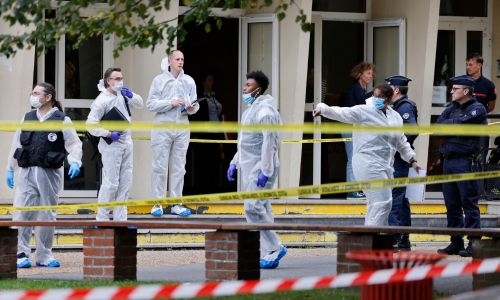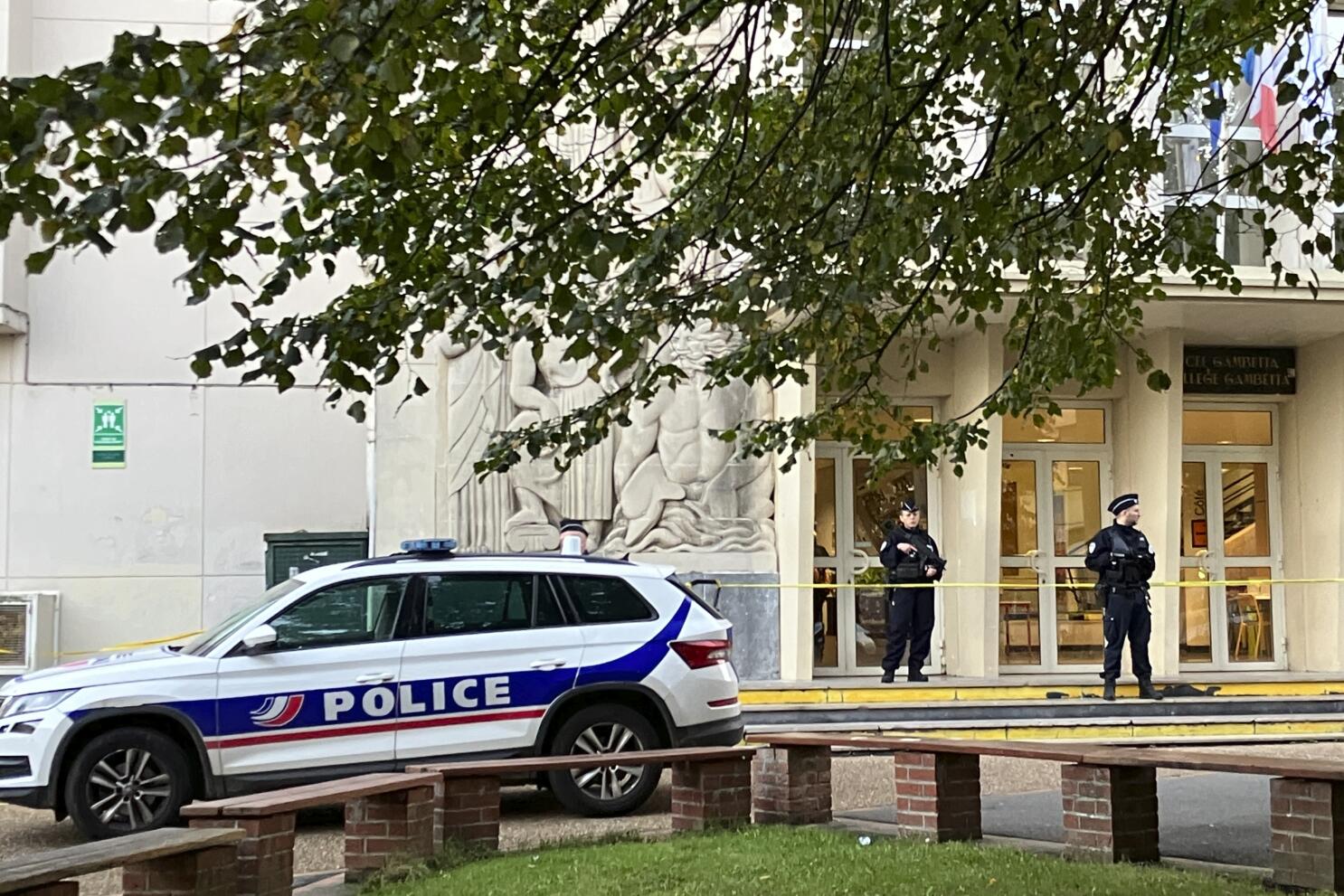France Bolsters Security with 7,000 Troops Following Horrific Teacher Slaying

France Bolsters Security with 7,000 Troops Following Horrific Teacher Slaying
In a resolute response to the shocking murder of a teacher by a former student, France has announced a sweeping deployment of 7,000 soldiers across the nation, as President Emmanuel Macron‘s office confirmed on Saturday. The assailant, identified as Mohamed M, not only ended the life of a dedicated educator but also left three other individuals wounded in a horrifying attack. President Macron, visibly shaken by the incident, visited the school and strongly condemned the act, declaring, “Once again a school was hit by the barbarity of Islamic terrorism.”
A Nation in Mourning
The dreadful incident unfolded on Friday in Conflans-Sainte-Honorine, a quiet suburb located northwest of Paris. A history teacher, Samuel Paty, was gruesomely murdered by the assailant, Mohamed M, who was swiftly apprehended by law enforcement. According to reports, Paty had been targeted due to his recent classroom discussions involving caricatures of the Prophet Muhammad, which had sparked controversy and, tragically, led to this act of violence.
The 47-year-old teacher had been known for his dedication to education and his commitment to freedom of expression. In light of the tragic event, France has come together in mourning, not only for the loss of a respected teacher but also for the terrifying reminder of the ongoing threat of terrorism within its borders.
A Security Escalation
With a heavy heart and a renewed focus on the security of its citizens, France has taken significant steps to enhance its security measures. The deployment of 7,000 troops is a clear signal that the government is dedicated to safeguarding the nation and its people.
The soldiers will be dispersed across the country, patrolling key areas, schools, and other critical locations. This initiative underscores the seriousness with which France is addressing the rising threat of terrorism and the need to protect its citizens, particularly in the educational system.
An Unsettling Pattern
The gruesome attack on Samuel Paty is just the latest in a series of disturbing incidents that have taken place in France over the past few years. These events, often perpetrated by individuals radicalized by extremist ideologies, have left the nation on edge. President Macron’s response to the teacher’s killing reflects the gravity of the situation, as he explicitly referred to it as an act of “Islamic terrorism.”
France has been grappling with a rising wave of terrorism for several years, a trend that has escalated since the infamous Charlie Hebdo attacks in 2015. The country has, unfortunately, become a target for extremists who take issue with the values of democracy, freedom of expression, and secularism that France holds dear.

Freedom of Expression vs. Sensitivity
The attack on Samuel Paty revolves around the delicate balance between freedom of expression and sensitivity to religious beliefs. Paty’s use of caricatures depicting the Prophet Muhammad during a lesson on free speech led to a confrontation with some parents who found this teaching offensive. As a result, the teacher received threats and complaints.
It is important to note that the use of caricatures has been a contentious issue in France for years. While freedom of expression is a fundamental value, it also sometimes clashes with religious sensitivities, leading to difficult discussions and, at times, social unrest.
Solidarity and Condemnation
The attack on Samuel Paty has provoked a swift and strong response from within France and around the world. A wave of solidarity with the teacher, his family, and the entire French nation has emerged. Vigils, gatherings, and statements of support have poured in from various quarters, emphasizing the global community’s stance against acts of terrorism.
Condemnation of the violence has been widespread. Leaders from numerous countries, including the United States, Germany, and the United Kingdom, have expressed their support for France and their rejection of violence in the name of any ideology.
The Psychological Impact
While the physical damage caused by acts of terrorism is evident, there is also a profound psychological impact on society. The fear, uncertainty, and trauma left in the wake of such events can be enduring and pervasive. For students, teachers, and parents in France, the attack on a school and a beloved teacher strikes deep emotional chords.
As the nation rallies together in solidarity, it also faces the challenge of healing the psychological wounds inflicted by such an act of brutality. It is a testament to the resilience of the French people that they continue to stand united in the face of adversity.

France’s Fight Against Extremism
France’s fight against extremism and terrorism is not a recent development but a long-standing struggle. The country’s secular principles and commitment to freedom of expression have been at odds with extremist ideologies, often manifesting in horrifying acts of violence.
In 2015, the attack on the Charlie Hebdo offices in Paris shocked the world. In this brutal incident, 12 people were killed in a targeted attack on the satirical magazine that had published caricatures of the Prophet Muhammad. This tragedy marked a turning point in France’s battle against extremism.
Subsequently, a series of other attacks, including the November 2015 Paris attacks and the 2016 Nice truck attack, have continued to keep France on high alert. The government has implemented various security measures to protect its citizens, but the threat remains a persistent concern.
Protecting the Values of the Republic
At the heart of France’s ongoing struggle against terrorism is its commitment to safeguarding the values of the Republic. Freedom of expression, secularism, and democracy are principles deeply ingrained in the French identity.
Secularism, in particular, plays a significant role in French society. It is the cornerstone of the nation’s commitment to individual rights and religious neutrality in public institutions. While this secular stance is often hailed as a symbol of liberty, it has also made France a target for extremists who reject such values.
The government’s decision to deploy 7,000 troops is an unequivocal statement of its commitment to preserving these values and ensuring the safety and security of its people. France’s resolve to confront terrorism is resolute, and it is committed to defending the principles that define its national identity.
The Ongoing Battle
The attack on Samuel Paty is a grim reminder that the battle against extremism is far from over. While France has implemented stringent security measures, including the state of emergency and enhanced surveillance, the risk of further incidents persists.
It is important to recognize that these acts of violence do not represent the views or beliefs of the broader Muslim community in France. They are the actions of individuals who have been radicalized and manipulated by extremist ideologies.
Efforts to prevent radicalization and promote understanding and tolerance within society are essential components of the fight against extremism. France, like many other nations, faces the challenge of balancing security with the protection of individual rights and civil liberties.
A Global Issue
The attack on Samuel Paty underscores the global nature of the challenge posed by extremism. Extremist ideologies transcend borders, and the battle against them requires international cooperation and solidarity.
The support and condemnation expressed by leaders from around the world demonstrate a collective determination to combat terrorism and uphold the values of freedom, democracy, and respect for all religions.
The attack in France is a stark reminder that no country is immune to the threat of extremism, and it is a shared responsibility to address and confront this challenge.
Conclusion
The brutal murder of Samuel Paty, a dedicated teacher, has left France in shock and mourning. In response to this horrific act of violence, the French government has deployed 7,000 troops to bolster security across the country, emphasizing its unwavering commitment to safeguarding the values of freedom of expression and secularism. This resolute move is part of a broader strategy to combat the persistent threat of extremism that has haunted France for several years.
France’s response to this tragedy is not only about immediate security measures but also about reaffirming its national identity. The country is determined to preserve its core values, even as it grapples with the challenges of the modern world, where terrorism knows no boundaries.




